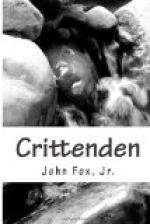He knew that national interest would centre in this regiment of Rough Riders; for every State in the Union had a son in its ranks, and the sons represented every social element in the national life. Never was there a more representative body of men, nor a body of more varied elements standing all on one and the same basis of American manhood. He recalled how, at Tampa, he had stood with the Colonel while the regiment filed past, the Colonel, meanwhile, telling him about the men—the strong men, who made strong stories for Wister and strong pictures for Remington. And the Colonel had pointed with especial pride and affection to two boy troopers, who marched at the head of his column—a Puritan from Massachusetts and a Cavalier through Virginia blood from Kentucky; one the son of a Confederate General, the other the son of a Union General—both beardless “bunkies,” brothers in arms, and fast becoming brothers at heart—Robert Sumner and Basil Crittenden. The Colonel waved his hand toward the wild Westerners who followed them.
“It’s odd to think it—but those two boys are the fathers of the regiment.”
And now that Grafton looked around and thought of it again—they were. The fathers of the regiment had planted Plymouth and Jamestown; had wrenched life and liberty and civilization from the granite of New England, the fastnesses of the Cumberland, and the wildernesses of the rich valleys beyond; while the sires of these very Westerners had gone on with the same trinity through the barren wastes of plains. And, now, having conquered the New World, Puritan and Cavalier, and the children of both were come together again on the same old mission of freedom, but this time the freedom of others; carrying the fruits of their own struggle back to the old land from which they came, with the sword in one hand, if there was need, but with the torch of liberty in the other—held high, and, as God’s finger pointed, lighting the way.
To think what he had missed!
As Grafton walked slowly back, an officer was calling the roll of his company under the quiet, sunny hill, and he stopped to listen. Now and then there was no answer, and he went on—thrilled and saddened. The play was ended—this was war.
Outside the camp the road was full of half-angry, bitterly disappointed infantry—Chaffee’s men. When he reached the camp of the cavalry at the foot of the hill again, a soldier called his name as he passed—a grimy soldier—and Grafton stopped in his tracks.
“Well, by God!”
It was Crittenden, who smiled when he saw Grafton’s bewildered face. Then the Kentuckian, too, stared in utter amazement at a black face grinning over Grafton’s shoulder.
“Bob!” he said, sharply.
“Yessuh,” said Bob humbly.
“Whar are you doing here?”
“Nothin’, Ole Cap’n—jes doin’ nothin’,” said Bob, with the naivete of a child. “Jes lookin’ for you.”




